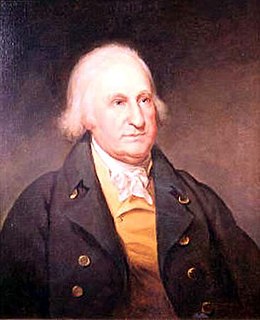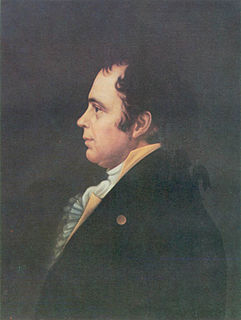Related Research Articles

John Eager Howard was an American soldier and politician from Maryland. He was elected as governor of the state in 1788, and served three one-year terms. He also was elected to the Continental Congress, the Congress of the United States and the U.S. Senate. In the 1816 presidential election, Howard received 22 electoral votes for vice president on the Federalist Party ticket with Rufus King. The ticket lost in a landslide.

The Society of the Cincinnati is a fraternal, hereditary society with thirteen constituent societies in the United States and one in France, founded in 1783, to perpetuate "the remembrance of this vast event", "to preserve inviolate those exalted rights and liberties of human nature," and "to render permanent the cordial affection subsisting among the officers" of the Continental Army who served in the Revolutionary War. Now in its third century, the Society promotes public interest in the Revolution through its library and museum collections, publications, and other activities. It is the oldest, patriotic hereditary society in America. Although the Society of the Cincinnati admits only male lineal or collateral descendants and male honorary members, a parallel organization, the Daughters of the Cincinnati, admits female descendants of Continental officers.

James McHenry was a Scotch-Irish American military surgeon and statesman. McHenry was a signer of the United States Constitution from Maryland, initiated the recommendation for Congress to form the Navy, and was the eponym of Fort McHenry. He represented Maryland in the Continental Congress. He was a delegate to the Maryland State Convention of 1788, to vote whether Maryland should ratify the proposed Constitution of the United States. He served as United States Secretary of War from 1796 to 1800, bridging the administrations of George Washington and John Adams.

Commodore Esek Hopkins was an American naval officer and slave trader. Hopkins was the only Commander in Chief of the Continental Navy during the American Revolutionary War. He was also an accomplished merchant captain and privateer. He is noted for his successful raid on the British port of Providence, in the Bahamas, and capturing large stores of military supplies.

Joshua Barney was an American Navy officer who served in the Continental Navy during the Revolutionary War. He later achieved the rank of commodore in the United States Navy and also served in the War of 1812.

Samuel Smith was a United States Senator and Representative from Maryland, a mayor of Baltimore, Maryland, and a general in the Maryland militia. He was the brother of cabinet secretary Robert Smith.

Samuel Nicholson was an officer in the Continental Navy during the American Revolutionary War and later in the United States Navy. Along with shipwright George Claghorn he oversaw the building of USS Constitution ("Old Ironsides"), and Nicholson was that ship's first commander.
James Nicholson was an officer in the Continental Navy during the American Revolutionary War.
William Carmichael Nicholson was an officer in the United States Navy during the War of 1812 and the Civil War.

William Smallwood was an American planter, soldier and politician from Charles County, Maryland. He served in the American Revolutionary War, rising to the rank of major general. He was serving as the fourth Governor of Maryland when the state adopted the United States Constitution.

John Hoskins Stone was an American planter, soldier, and politician from Charles County, Maryland. During the Revolutionary War he led the 1st Maryland Regiment of the Continental Army. After the war he served in the state legislature and was the seventh Governor from 1794 to 1797.

Rear Admiral John Henry Russell was an officer of the United States Navy during the Mexican–American War and the American Civil War.

James Winchester was an officer in the Continental Army in the American Revolutionary War (1775–1783) and a brigadier general during the War of 1812 (1812–1815). He commanded the American forces at the Battle of Frenchtown, which led to the Massacre of the River Raisin.

Captain Michael Cresap was a noted frontiersman born in Maryland.

Mordecai Gist (1743–1792) was a member of a prominent Maryland family who became a Brigadier General in command of the Maryland Line in the Continental Army during the American Revolutionary War.
John Crane was a participant in the Boston Tea Party and a soldier during the American Revolutionary War.

William Paca was a signatory to the United States Declaration of Independence from Maryland, a delegate to the First Continental Congress and the Second Continental Congress from Maryland, Governor of Maryland and a United States District Judge of the United States District Court for the District of Maryland.

Oswald Tilghman (1841–1932) was an Officer of Confederate States Army during the American Civil War; a lawyer; Maryland politician; Maryland Senator, Talbot County, (1894–96); Secretary of State of Maryland (1904–08); affiliate of the Maryland Democratic Party; author; and was active in veteran affairs. Native of Talbot County, Maryland.
Major Thomas Lancaster Lansdale was an American soldier who served as an officer in the Continental Army during the Revolutionary War.

John Chester (1749–1809) was a militia officer and public official from Connecticut. Before the American Revolution, he was a militia officer and member of the Connecticut General Assembly. During the American Revolutionary War, he saw action from the Battle of Bunker Hill to the Battle of Trenton as part of Connecticut's troops, but he did not join the Continental Army, and left military service after 1776. He served as Speaker of the Connecticut House of Representatives, among other public offices, and was an original member of the Society of the Cincinnati. His grandson Samuel Chester Reid served in the United States Navy during the War of 1812.
References
This article incorporates text from the public domain Dictionary of American Naval Fighting Ships .
- ↑ Metcalf, Bryce (1938). Original Members and Other Officers Eligible to the Society of the Cincinnati, 1783-1938: With the Institution, Rules of Admission, and Lists of the Officers of the General and State Societies. Strasburg, VA: Shenandoah Publishing House, Inc., p. 237.
- ↑ "Officers Represented in the Society of the Cincinnati". The American Revolution Institute of the Society of the Cincinnati. Retrieved 15 March 2021.